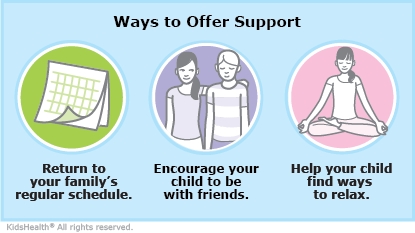A child or teen with functional neurological symptom disorder (also called conversion disorder):
- has trouble with how their body moves or feels, or how the senses (for example, seeing or hearing) work
- had a medical workup that does not show a medical reason for the symptoms
- has symptoms that make everyday life hard
Most kids get better once they understand the disorder and get treatment for conditions that may make it worse (such as anxiety or depression).

Follow your health care provider's advice for:
- creating a care team to help your child. The team may include a neurologist, mental health provider (such as a psychiatrist, psychologist, or counselor), physical therapist, and occupational therapist.
- whether medicine would help your child
- whether your child needs any medical testing
- when to follow up
- which provider you should call with questions (this will likely be your child's mental health provider)
Talk about functional neurological symptom disorder with your child:
- Explain that there is a problem with how signals are being sent and received by the body, but no specific medical problem is causing their symptoms.
- Explain that the mind and body are connected, and emotions and feelings can lead to symptoms in the body that are real.
- Reassure your child that you believe that their symptoms are real and that you support them.
- Let your child know that these symptoms will likely get better with time.
- Get more information and support online at FND Hope (fndhope.org).
Help your child return to daily routines (even if they still have symptoms):
- Encourage them to join in all family meals and activities.
- Help them get back to school as soon as possible. Talk to the school nurse and your child's teachers so they can support your child and let you know how things are going.
- Encourage normal activities as much as possible, such as sports, hobbies, and having friends over.
If your child is having unwanted movements, moving their attention away from them may help lessen the movements. They can try:
- talking to a family member or friend
- tapping or using a different part of the body
- playing a game or doing another activity they enjoy
If your child's movements make it hard to do other activities, stay with them and calmly tell them that the movements will pass.
Stress can make symptoms worse. To help your child manage and relieve stress:
- Encourage your child to be physically active every day. Adjust activities to their abilities. Walking, stretching, or going for a bike ride are all good ways to stay active.
- Make sure your child gets enough sleep and eats a healthy diet.
- Try relaxation techniques like meditation, yoga, or deep breathing.
- Talk to your child's mental health provider about other ways to help your child manage their symptoms and stress.

Your child is very depressed or has thoughts of suicide (ending their life). You or your child can also call or text the National Suicide Prevention Lifeline at 988 for help.

What are the symptoms of functional neurological symptom disorder? Symptoms can include:
- pain
- weakness
- trouble walking
- not being able to speak or hear
- vision problems (like double vision or tunnel vision)
- trouble swallowing
- tiredness
- dizziness
- muscle spasms
- jerking movements that look like seizures (called psychogenic nonepileptic seizures or pseudoseizures)
What causes functional neurological symptom disorder? The cause is not clear. Some experts think that it comes from emotional stress or trauma being "converted" into physical symptoms (that's why it's sometimes called "conversion disorder"). But it also can happen without a clear emotional trigger.
Even though the cause is not understood, the symptoms are real. A child with conversion disorder is not faking or purposely causing their symptoms.




